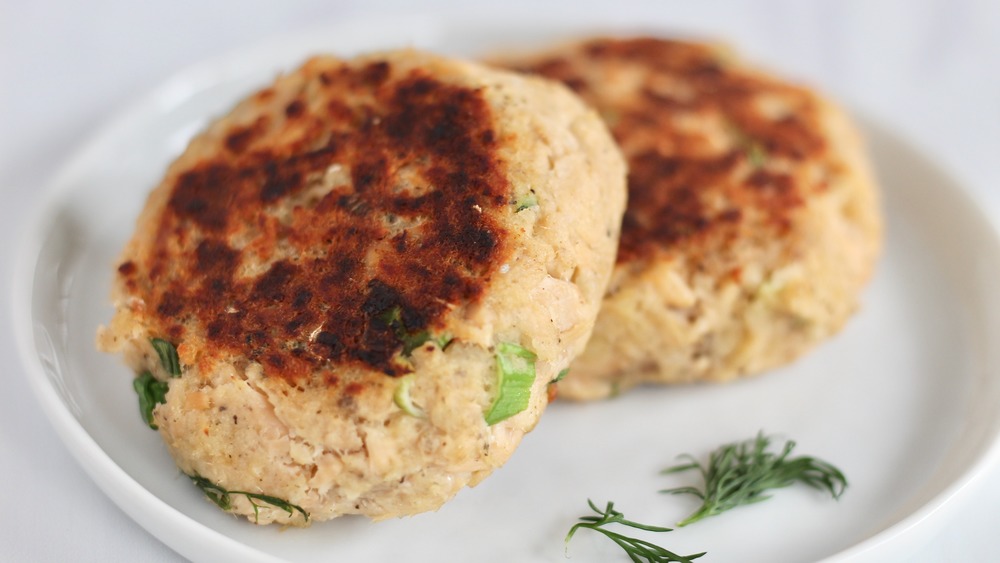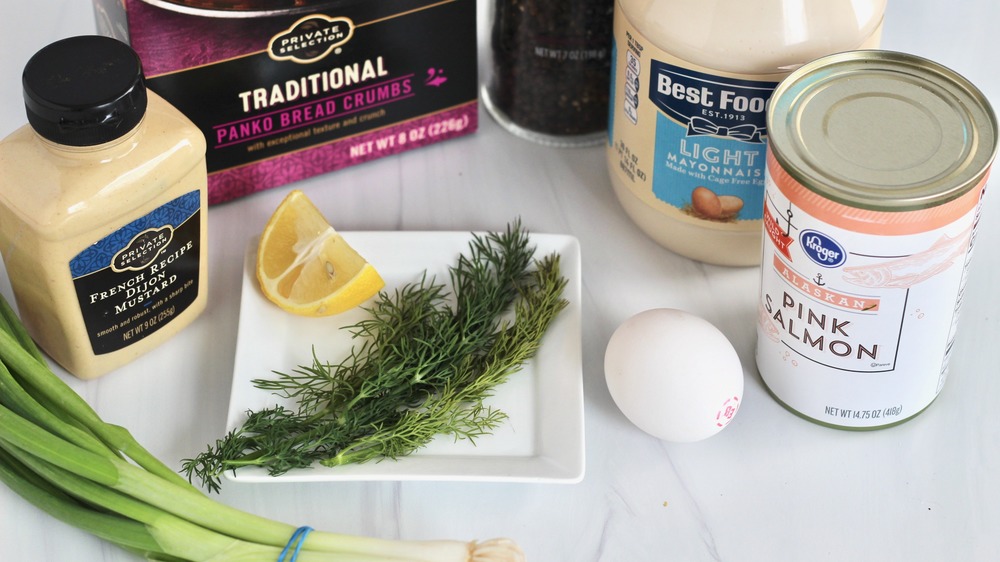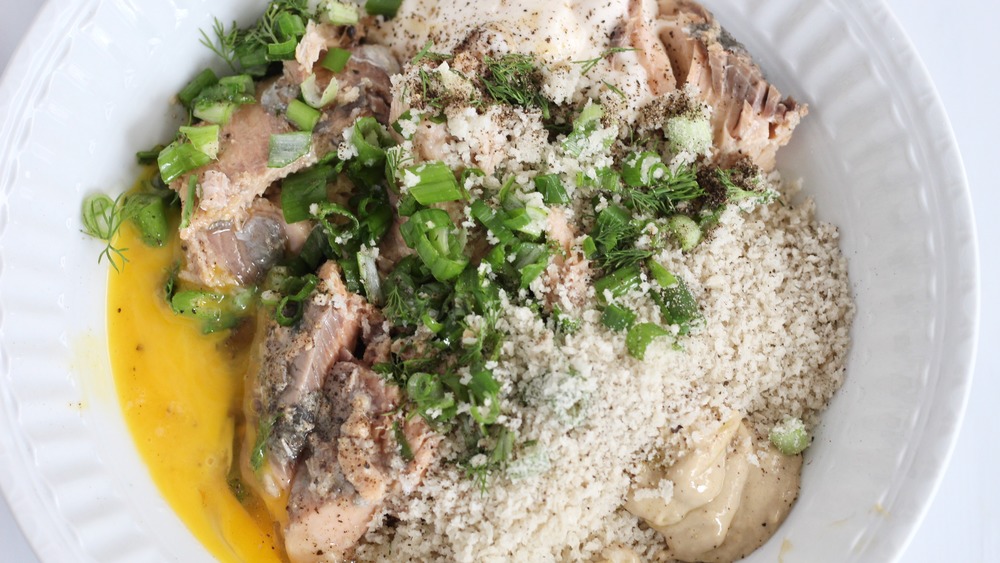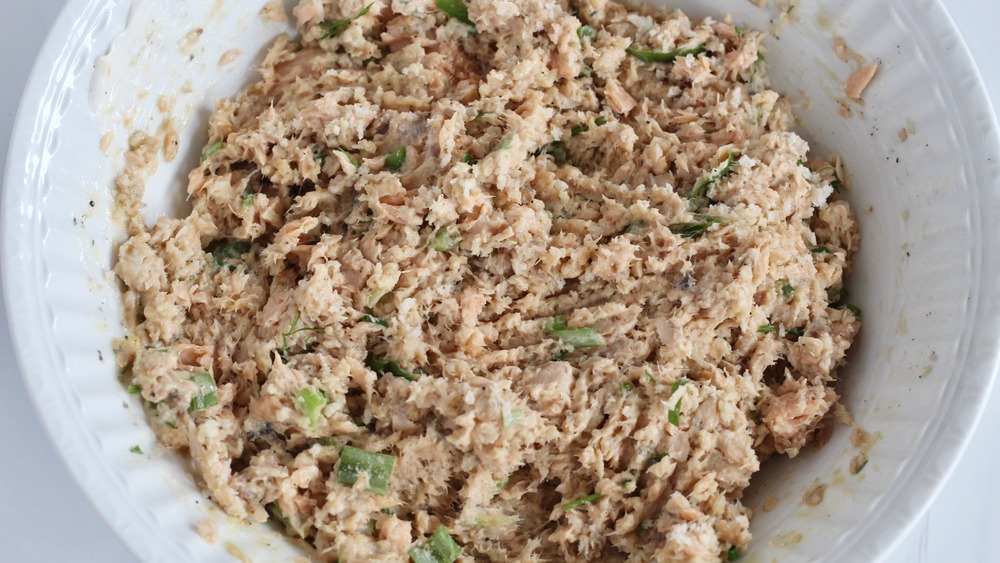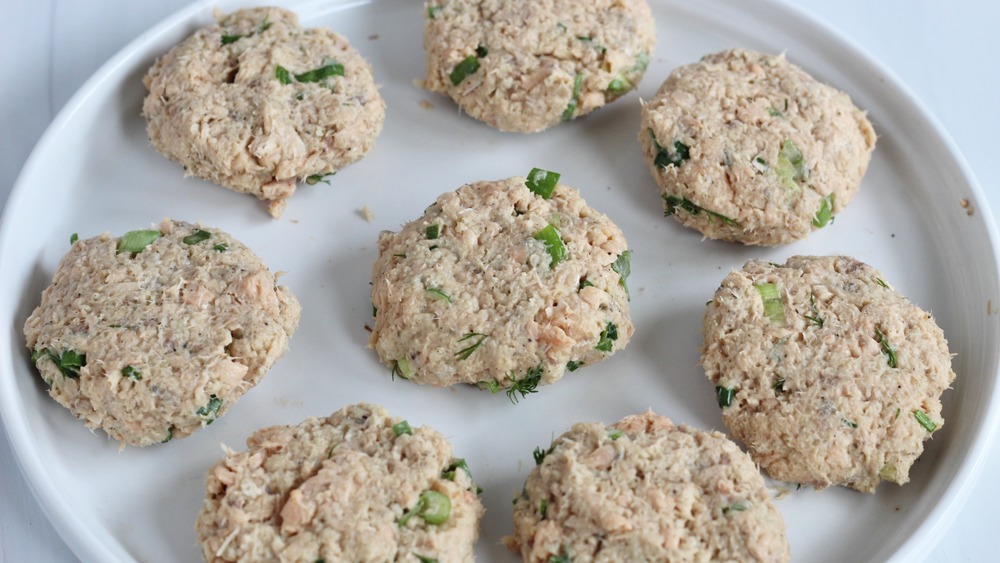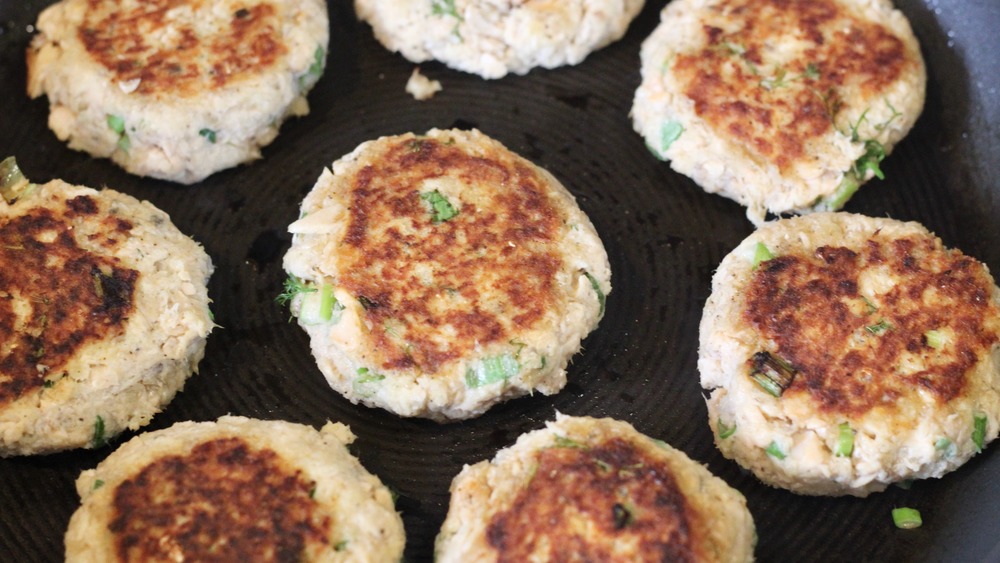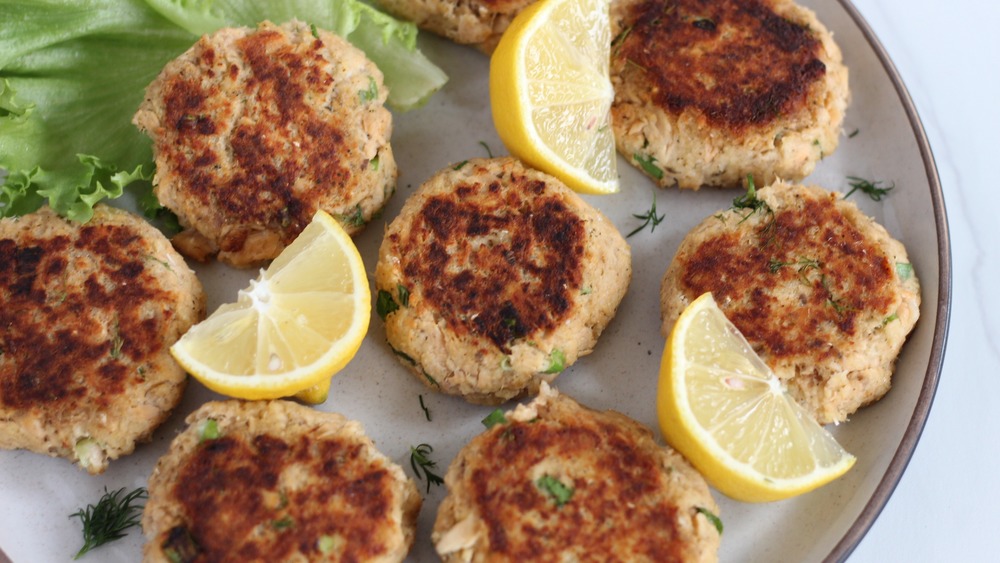Easy Salmon Patty Recipe
Sometimes, the best recipes are classic dishes with everyday ingredients. That's why we love these easy and delicious salmon patties. Salmon patties, also known as salmon croquettes, date all the way back to the era of the Great Depression. It was at this time that Americans' diets were lacking in sufficient protein and important nutrients. Then entered canned salmon, which cost very little. This affordable pantry staple combined with simple ingredients like breadcrumbs and eggs made for a satisfying new meal.
Salmon patties continue to be enjoyed in homes across the country. Since this recipe requires common ingredients you probably already have on hand, it's a great meal to whip up without having to make a trip to the store. These salmon patties are also packed with lean protein and heart-healthy omega-3 fats.
Check out other easy, healthy recipes by registered dietitian nutritionist Mackenzie Burgess on her blog at Cheerful Choices.
Gather the ingredients for these easy salmon patties
There are just a few simple ingredients used in this recipe for salmon patties. The recipe as written makes eight patties, which is enough for four servings. If you want to make more than eight patties, simply double or triple the recipe.
The key ingredient here is canned salmon. For this recipe, we are using canned salmon because it is shelf stable, pre-cooked, and much cheaper than buying salmon fresh. Canned salmon still provides the same incredible health benefits. Salmon is rich in immune-supporting vitamin D, lean protein, and heart-healthy omega 3 fatty acids.
In fact, the American Heart Association recommends eating two servings of fish per week to reap all these great health benefits. Try varying your seafood intake throughout the week with different fish like salmon, shrimp, tuna, trout, tilapia, cod, or any of your favorites.
Add everything to one large bowl to make these salmon patties
This recipe is as easy as combining the ingredients and stirring together. The only ingredient you really have to prep is canned salmon. Be sure to drain the canned salmon completely. This helps ensure the salmon patties stick together.
After you drain it, you can choose to remove the white round bones found in the middle of the filets. Removing will lend a smoother salmon patty. However, the bones are softened and completely edible too. If you choose to use them, be sure to give them a good mash to incorporate them in. As a bonus, the bones are a great source of calcium.
Chopped dill adds a pop of bright flavor into the patties. If you don't have fresh dill, you can use a teaspoon of dried dill instead. You use a smaller amount with dried herbs because their flavor is more concentrated.
Mash all ingredients for salmon patties together with a fork
After you add all your ingredients for salmon patties to a bowl, mash everything together with a fork. After about a minute of stirring, the mixture should start to come together into a dough-like consistency. The eggs and breadcrumbs act as a binder, helping everything stick together.
If you find that it's not sticking together, add in more breadcrumbs and stir until it starts to come together. If you run out of breadcrumbs or don't have any on hand, you can always make your own. Simply toast bread until golden, then grind the bread into fine pieces using a food processor or by crushing with a rolling pin.
Form the mixture into salmon patties
Use your hands to roll a small portion of the "dough" into a ball. Then, flatten into a patty shape. Repeat until the mixture is completely used up and you have eight equally sized salmon patties. They should be around three inches in width.
If you are making this recipe ahead of time, this would be a good point to stop and save the uncooked patties until you are ready to cook. You can also freeze the uncooked patties at this point. If you want to freeze the patties, place them on the cutting board or baking sheet lined with parchment paper and freeze for about two hours. Once frozen, wrap each uncooked salmon patty in plastic wrap and place into a labeled freezer bag. These patties can last for up to two months in the freezer. When it comes time to cook them, thaw the patties in the fridge.
Cook salmon patties on each side until browned
Use a large pan that can fit all the salmon patties, if possible. If not, work in batches. Start by generously spraying your pan with cooking spray over medium-high heat. Once hot, add salmon patties in an even layer. You should hear a slight sizzle when the patty hits the pan. This is a sign of beautiful browning beginning to happen! Cook for two to three minutes, then flip and cook for two to three minutes longer. That's it! They cook up super quickly and are ready to go.
Enjoy these salmon patties warm
Salmon patties are best warm so serve them immediately after cooking. We like to serve these with roasted potatoes, roasted colorful vegetables, over a bed of leafy greens, or between two whole grain buns. You can also whip up a quick dill sauce or simple creme fraiche to serve over top. For elegant presentation, serve with lemon wedges and more fresh dill sprinkled over top.
Add this easy, budget-friendly recipe to your weekly menu or meal prep routine! It also makes for a great party appetizer or protein-packed snack.
Salmon patties directions
Sometimes, the best recipes are classic dishes with everyday ingredients. That's why we love these easy and delicious salmon patties.
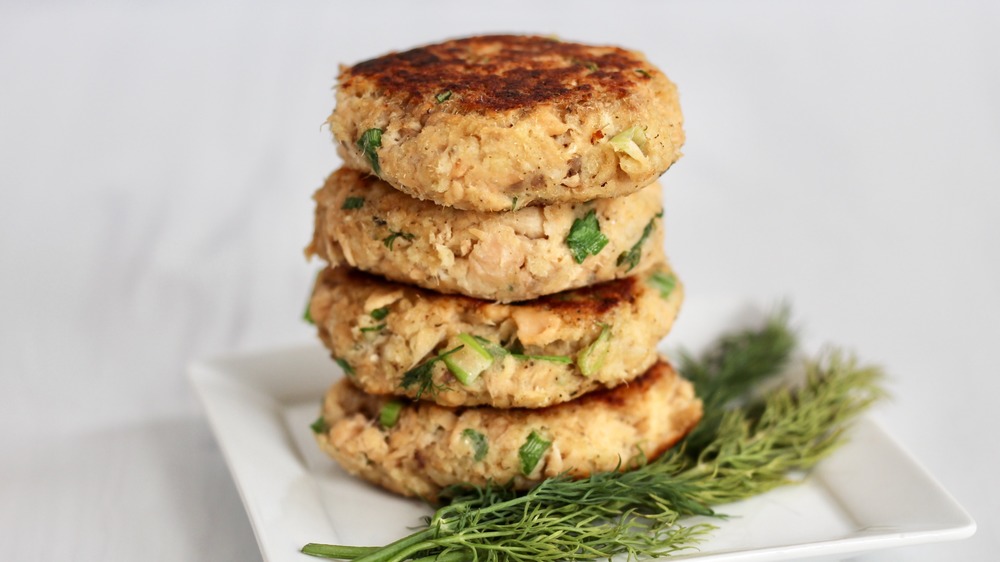
Ingredients
- 1 (14.75-ounce) can salmon, drained and bones removed
- 2 green onions, thinly sliced
- 1 tablespoon fresh dill, chopped
- 1/2 cup panko breadcrumbs
- 1/4 cup low fat mayonnaise
- 1 tablespoon lemon juice
- 1 tablespoon Dijon mustard
- 1 large egg, beaten
- ½ teaspoon black pepper
- Cooking spray
Directions
- Add all ingredients (except for cooking spray) into a large bowl and mix until well incorporated.
- Using hands, form into 8 small patties. Chill patties until ready to cook.
- Spray cooking spray over a large pan over medium-high heat. Cook patties until golden and crispy, about 2 to 3 minutes per side.
- Serve salmon patties with leafy greens and lemon wedges, if desired.
Nutrition
| Calories per Serving | 173 |
| Total Fat | 8.9 g |
| Saturated Fat | 1.4 g |
| Trans Fat | 0.0 g |
| Cholesterol | 88.8 mg |
| Total Carbohydrates | 5.3 g |
| Dietary Fiber | 0.5 g |
| Total Sugars | 0.8 g |
| Sodium | 385.5 mg |
| Protein | 17.9 g |
